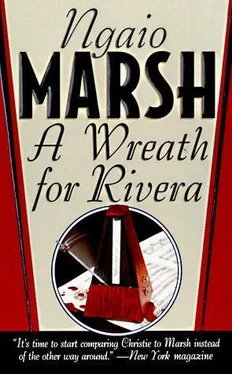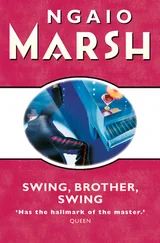He thought it advisable however, to say nothing. Lady Pastern, erecting her bust and settling her shoulders, continued:
“I need not remind you of my husband’s eccentricities. They are public property. You have seen for yourself to what lengths of imbecility he will go. I can only assure you that though he may be, and indeed is, criminally stupid, he is perfectly incapable of crime as the word is understood in the profession you have elected to follow. He is not, in a word, a potential murderer. Or,” she added, apparently as an afterthought, “an actual one. Of that you may be assured.” She looked affably at Alleyn. Evidently, he thought, she had been a dark woman. There was a tinge of sable in her hair. Her skin was sallow and he thought she probably used something to deal with a darkness of the upper lip. It was odd that she should have such pale eyes. “I cannot blame you,” she said, as he was still silent, “if you suspect my husband. He has done everything to invite suspicion. In this instance, however, I am perfectly satisfied that he is guiltless.”
“We shall be glad to find proof of his innocence,” Alleyn said.
Lady Pastern closed one hand over the other. “Usually,” she said, “I comprehend entirely his motives. But entirely. On this occasion, however, I find myself somewhat at a loss. It is obvious to me that he develops some scheme. But what? Yes: I confess myself at a loss. I merely warn you, Mr. Alleyn, that to suspect my husband of this crime is to court acute embarrassment. You will gratify his unquenchable passion for self-dramatization. He prepares a dénouement .”
Alleyn took a quick decision. “It’s possible,” he said, “that we’ve anticipated him there.”
“Indeed?” she said quickly. “I am glad to hear it.”
“It appears that the revolver produced last night was not the one Lord Pastern loaded and took to the platform. I think he knows this. Apparently it amuses him to say nothing.”
“Ah!” She breathed out a sound of immense satisfaction. “As I thought. It amuses him. Perfectly! And his innocence is established, no doubt?”
Alleyn said carefully: “If the revolver produced is the one he fired, and the scars in the barrel suggest that it is, then a very good case could be made out on the lines of substitution.”
“I’m afraid I do not understand. A good case?”
“To the effect that Lord Pastern’s revolver was replaced by this other one which was loaded with the bolt that killed Rivera. That Lord Pastern fired it in ignorance of the substitution.”
She had a habit of immobility but her stillness now declared itself as if until this moment she had been restless. The creased lids came down like hoods over her eyes. She seemed to look at her hands. “Naturally,” she said, “I make no attempt to understand these assuredly very difficult complexities. It is enough, little as he deserves to escape, that my husband clears himself.”
“Nevertheless,” Alleyn said, “it remains necessary to discover the guilty person.” And he thought: “Damn it, I’m beginning to talk like a French phrase book, myself!”
“No doubt,” she said.
“And the guilty person, it seems obvious, was one of the party who dined here last night.”
Lady Pastern now closed her eyes completely. “A most distressing possibility,” she murmured.
“Hands,” Alleyn thought. “Carlisle Wayne’s hand fingering her neck. Miss Henderson’s hand jerking the photograph off the mantelpiece. Lady Pastern’s hands closing upon each other like vices. Hands.”
“Furthermore,” he said, “if the substitution theory is right, the time field is narrowed considerably. Lord Pastern put his revolver under his sombrero on the edge of the band dais, you remember.”
“I made a point of disregarding him,” his wife said instantly. “The whole affair was entirely distasteful to me. I did not notice and therefore I do not remember.”
“That’s what he did, however. The possibilities, as far as substitution goes, are therefore limited to the people who were within easy reach of his sombrero.”
“No doubt you will question the waiters. The man was of the type which makes itself insufferable to servants.”
“By Gum,” Alleyn thought, “you’re almost one up on me there, old girl!” But he said: “We must remember that the substituted weapon was charged with a bolt and blank cartridges. The bolt was made out of a section of your parasol handle and its point of a stiletto from your work-box.” He paused. Her fingers were more closely interlocked but she didn’t move or speak. “And the blanks,” he added, “were, it is almost certain, made by Lord Pastern and left in his study. The waiters are ruled out, I think.”
Her lips parted and closed again. She said: “Am I, perhaps, being stupid? It seems to me that this theory of substitution may embrace a wider field. Why could the change of weapons not have been effected before my husband appeared? He was later than the others in appearing. So, for example, was Mr. Bellairs. I believe that is the conductor’s name.”
“Lord Pastern insists that neither Bellairs nor anyone else had an opportunity to get at his revolver, which he says he carried in his hip pocket until he put it under the sombrero. I am persuaded that the change-over was effected after Lord Pastern made his entrance on the band dais and it’s obvious that the substituted revolver must have been prepared by someone who had access to your parasol…”
“In the restaurant,” she interrupted quickly. “Before the performance. The parasols must have been within reach of all of them.”
“… and also access to the study in this house.”
“Why?”
“To get the stiletto which was carried there.”
She drew in her breath sharply. “It may have been an entirely different stiletto, I imagine.”
“Then why has this particular one disappeared from the study? Your daughter took it away from the drawing-room when she left for her interview in the study with Rivera. Do you remember that?”
He could have sworn that she did if only because she made no sign whatsoever. She couldn’t conceal the start of astonishment or dismay which this statement should have produced if she hadn’t been prepared for it.
“I remember nothing of the sort,” she said.
“That is what happened however,” Alleyn said, “and it appears that the steel was removed in the study, since we found the ivory handle there.”
After a moment she lifted her chin and looked directly at him. “It is with the greatest reluctance that I remind you of the presence of Mr. Bellairs in this house last night. I believe he was in the study with my husband after dinner. He had ample opportunity to return there.”
“According to Lord Pastern’s time-table, to which you have all subscribed, he had from about a quarter to ten until half past when, with the exception of Rivera and Mr. Edward Manx, the rest of the party was upstairs. Mr. Manx, I remember, said he was in the drawing-room during this period. He had, by the way, punched Rivera on the ear shortly beforehand.”
“Ah!” Lady Pastern breathed out her small ejaculation. She took a moment or two over digesting this information and Alleyn thought she was very well pleased with it. She said, “Dear Edward is immensely impulsive.”
“He was annoyed, I gather, because Rivera had taken it upon himself to kiss Miss Wayne.”
Alleyn would have given a lot to have Lady Pastern’s thoughts floating above her head in clear letters, encased by a balloon as in one of Troy’s little drawings, or to have heard them through spectral earphones. Were there four elements? Desire that Manx should be concerned only with Félicité? Gratification that Manx should have gone for Rivera? Resentment that Carlisle and not Félicité had been the cause? And fear — fear that Manx should be more gravely involved? Or some deeper fear?
Читать дальше






